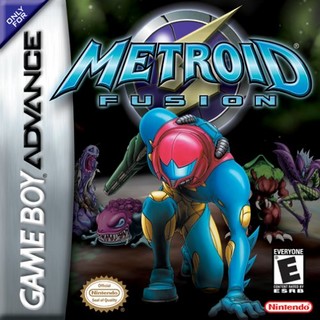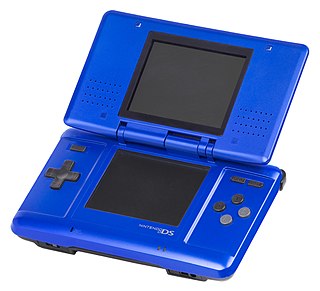Advance America may refer to:
- Advance America (advocacy group), a political lobbying organization in Indiana
- A payday loan provider in the United States owned by Grupo Elektra
Advance America may refer to:

The Game Boy Advance (GBA) is a 32-bit handheld game console developed, manufactured and marketed by Nintendo as the successor to the Game Boy Color. It was released in Japan on March 21, 2001, in North America on June 11, 2001, in the PAL region on June 22, 2001, and in mainland China as iQue Game Boy Advance on June 8, 2004. The GBA is part of the sixth generation of video game consoles. The original model was followed in 2003 by the Game Boy Advance SP, a redesigned model with a frontlit screen and clamshell form factor. A newer revision of the SP with a backlit screen was released in 2005. A miniaturized redesign, the Game Boy Micro, was released in September 2005.

Super Mario Bros. 2 is a platform video game developed and published by Nintendo for the Nintendo Entertainment System. It was first released in North America in September 1988, and in the PAL region in 1989.

The Legend of Zelda: A Link to the Past is an action-adventure game developed and published by Nintendo for the Super Nintendo Entertainment System. It is the third game in The Legend of Zelda series and was released in 1991 in Japan and 1992 in North America and Europe.
Adl is an Arabic word meaning justice.
APA most often refers to:

The Game Boy Advance SP, released in Japan on February 14, 2003, is a sixth-generation handheld game console developed, released, and marketed by Nintendo that served as an upgraded version of the original Game Boy Advance. The "SP" in the name stands for "Special". It is the penultimate console in the Game Boy Advance product line before the Game Boy Micro, which was released in September 2005.

Metroid Fusion is an action-adventure game developed and published by Nintendo for the Game Boy Advance in 2002. It was developed by Nintendo Research & Development 1, which had developed the previous Metroid game, Super Metroid (1994). Players control the bounty hunter Samus Aran, who investigates a space station infected with shapeshifting parasites known as X.

Final Fantasy Tactics Advance is a 2003 tactical role-playing game developed and published by Square for the Nintendo Game Boy Advance. A spin-off of the Final Fantasy series, the game shares several traits with 1997's Final Fantasy Tactics, although it is not a direct sequel. The player assembles a clan of characters, and controls their actions over grid-like battlefields. Players are mostly free to decide the classes, abilities, and statistics of their characters.

The Nintendo DS is a foldable handheld game console produced by Nintendo, released globally across 2004 and 2005. The DS, an initialism for "Developers' System" or "Dual Screen", introduced distinctive new features to handheld games: two LCD screens working in tandem, a built-in microphone and support for wireless connectivity. Both screens are encompassed within a clamshell design similar to the Game Boy Advance SP. The Nintendo DS also features the ability for multiple DS consoles to directly interact with each other over Wi-Fi within a short range without the need to connect to an existing wireless network. Alternatively, they could interact online using the now-defunct Nintendo Wi-Fi Connection service. Its main competitor was Sony's PlayStation Portable during the seventh generation of video game consoles.
Advance commonly refers to:
Advance Publications, Inc. is a privately held American media company owned by the families of Donald Newhouse and Samuel Irving Newhouse Jr., the sons of company founder Samuel Irving Newhouse Sr. It owns a large number of subsidiary companies, including American City Business Journals and Condé Nast, and is a major shareholder in Charter Communications, Reddit and Warner Bros. Discovery.

The GameCube Game Boy Advance cable (DOL-011) is a video game accessory manufactured by Nintendo which is used to connect the Game Boy Advance (GBA) handheld console to the GameCube (GCN) home console. Depending on the games it is used with, the cable may facilitate transferring data between related games, unlocking additional content, or turning the GBA into a controller or second screen.

Advance Wars: Dual Strike, known as Famicom Wars DS in Japan, is a turn-based strategy video game developed by Intelligent Systems and published by Nintendo for the Nintendo DS handheld game console. It is the third installment in the Advance Wars series and was released in 2005 for Japan on June 23, in North America on August 22, in Europe on September 30 and in Australia on March 22, 2006. The game is preceded by Advance Wars 2: Black Hole Rising and Advance Wars and succeeded by Advance Wars: Days of Ruin. Advance Wars is the international title of the Wars video game series, which dates back to the Family Computer game Famicom Wars in 1988.

Independent music is music produced independently from commercial record labels or their subsidiaries; this may include an autonomous, do-it-yourself approach to recording and publishing.
Bye or BYE may refer to:

In public transport, a request stop, flag stop, or whistle stop is a stop or station at which buses or trains, respectively, stop only on request; that is, only if there are passengers or freight to be picked up or dropped off. In this way, stops with low passenger counts can be incorporated into a route without introducing unnecessary delay. Vehicles may also save fuel by continuing through a station when there is no need to stop.
Pop or POP may refer to:
This is a list of video game accessories that have been released for the Game Boy handheld console and its successors. Accessories add functionality that the console would otherwise not have.
DramaFever was a video streaming website owned by Warner Bros. that offered on-demand streaming video of documentaries, movies, and TV shows with subtitles. DramaFever's content offering was both ad-supported for regular users and available in high definition for premium subscribers.